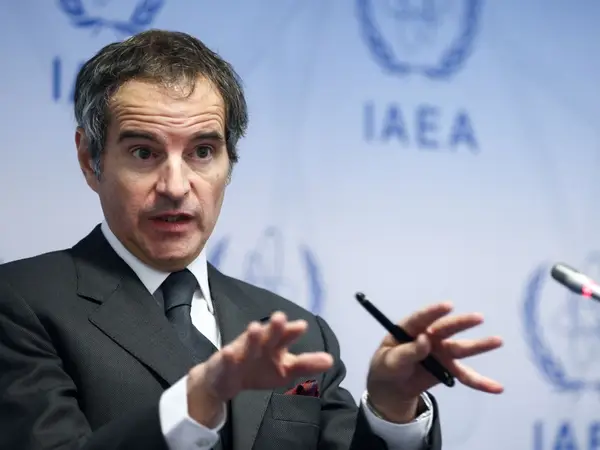After critical reports on Iran from the UN nuclear watchdog (IAEA), France has said “a strong message” should go from an IAEA board meeting due November 24-25.
Foreign ministry spokeswoman Anne-Claire Legendre told reporters Tehran should “return without delay to fulfilling all its commitments and obligations…resume cooperation…and return to full implementation of the JCPOA.”
Talks aimed at reviving the JCPOA (Joint Comprehensive Plan of Action), Iran’s 2015 nuclear deal with world powers, should resume between Iran and world powers in Vienna November 29.
This will be the first round of talks with emissaries of the new administration led by President Ebrahim Raisi (Raisi). The United States, which left the JCPOA in 2018 and imposed ‘maximum pressure’ sanctions on Iran, will take part indirectly, as it did before the talks lapsed in June.
Grossi In Tehran Next Tuesday
While the IAEA would monitor a revived JCPOA, its director-general Rafael Mariano Grossi has more immediate concerns. The IAEA has confirmed that Grossi will be in Tehran for meetings Tuesday with senior officials, including Foreign Minister Hossein Amir-Abdollahian and Mohammad Eslami, head of the Atomic Energy Organization of Iran.
Grossi has for two months requested such meetings to discuss current ‘temporary’ arrangements for IAEA access and what the agency says are questions left unanswered by Iran over past apparent nuclear activity in sites undeclared to the agency.
Grossi is keen to restore access to a manufacturing site in Karaj to service monitoring equipment, which Iran has not allowed despite a September 12 agreement.
The IAEA chief earlier this month told AP he was “flying in a heavily clouded sky.” The Wall Street Journal reported Tuesday that Iran had resumed making parts for advanced centrifuges at Karaj, which the Journal said the IAEA had no knowledge of.
Irking France, as well as the two other European JCPOA signatories – Germany and the United Kingdom – and the US, were IAEA reports this week that inspectors had faced intrusive searches and that Iran had accumulated 17.7kg of uranium enriched to 60 percent, a jump from 10kg in under three months, and 113.8kg enriched to 20 percent, up from 84kg over the same period.
Under the JCPOA, Iran is allowed to enrich only to 3.67 percent. But since 2019, following US ‘maximum pressure,’ Tehran has gradually exceeded JCPOA limits, by using advanced centrifuges as well as by enriching increasingly close to the 90 percent regarded as ‘weapons grade.’
An interim nuclear agreement?
A further complication lies in reports of recent discussions over an interim agreement under which both the US and Iran would take steps towards a renewed JCPOA, the US by ‘allowing’ the unfreezing of Iranian assets currently held by third-parties in fear of punitive US action and Tehran by curbing some aspects of its nuclear program.
Axios news site reported Wednesday that US National Security Advisor Jake Sullivan had raised the prospect of an interim deal with his Israel counterpart Eyal Hulata, after it had been suggested by a European state.
Tehran’s pronouncements on JCPOA revival have stressed its commitment to reviving the deal as agreed in July 2015 rather than seeking interim steps or modifying it. But the JCPOA was itself preceded by an interim agreement, the 2013 Joint Plan of Action, under which Iran froze parts of its nuclear program in return for reduced international sanctions.
An interim agreement could postpone the need for agreement on a crucial difficulty facing negotiators in Vienna during talks April-June, that of agreeing which US sanctions contravened the JCPOA. Reports suggested Iran argued that all sanctions imposed by the Trump administration – whether on ‘nuclear’ or ostensibly other grounds – would need to be lifted.
